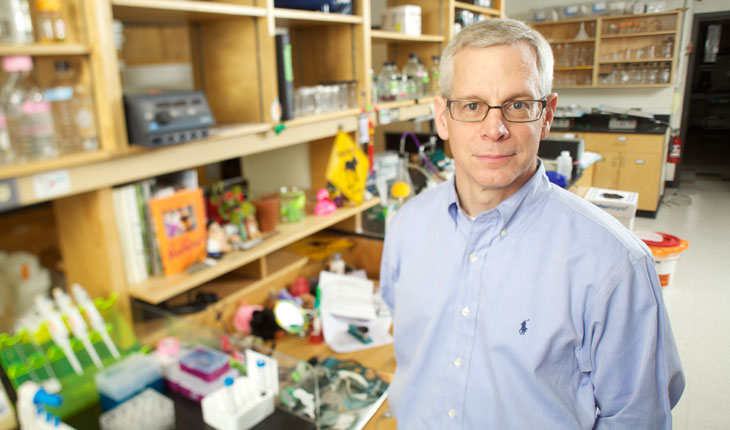For Release: July 17, 2013
Contact: Derik Hertel, (603) 650-1211 or Derik.Hertel@Dartmouth.edu
Dartmouth Biochemistry Researcher Duane Compton Receives NIH MERIT Award
Hanover, NH—Obtaining research funding is a constant challenge for scientists in any field, yet faculty at Dartmouth's Geisel School of Medicine continue to secure prominent grants to continue biomedical research that paves the way for better treatment for patients. Duane Compton, PhD, a professor of biochemistry and senior associate dean for research at Geisel, has recently received a MERIT Award from the National Institutes of Health (NIH) in recognition of his research on the mechanisms of chromosome segregation.
The "Method to Extend Research in Time" (MERIT) Award provides long-term stable support to select investigators who demonstrate "superior competence and outstanding productivity during their previous research endeavors." The award's main purpose is to encourage continued creativity by providing an opportunity to gain up to ten years of continued grant support, relieving recipients from having to complete frequent grant renewal applications. The award is split into two parts: an initial five-year award followed by an opportunity to extend the award three to five years based on a review of the researcher's accomplishments during the initial period.
Compton received the award through the NIH's National Institute of General Medical Sciences, which presents the award with the understanding that the scientist's creative and innovative research will have an "exceptional" impact on their field.
For Compton, the award reflects the hard work of colleagues in his lab. "It's an honor for me," he says, "but it's an honor that I share with the students and fellows that have worked in my laboratory who have done so much to contribute to our success."
"This is a major accomplishment for Duane and wonderful news for Geisel," says Geisel Dean Wiley "Chip" Souba, MD, ScD, MBA. "Duane Compton is an exceptional, long-time researcher and leader at Geisel whose findings have made a substantial impact on our understanding of chromosome instability in tumor cells. The MERIT Award will allow Duane and many others working in his lab to continue important research, build on new ideas in their field, and as a result, help to foster new collaborations across Geisel."
Other Geisel faculty who have previously received MERIT awards include Charles Barlowe, MD; Constance Brinckerhoff, PhD.; Ta-Yuan Chang, PhD; Jay Dunlap, PhD; Eugene Nattie, MD; Randy Noelle, PhD; Ronald Taylor, PhD; Bernard Trumpower, Ph.D.; and William Wickner, MD.
Compton is proud to be a part of this group. "I am privileged to be among an amazing group of other Geisel faculty that have received MERIT awards from the NIH," he says. Compton, a faculty member at Geisel since 1993, has made a number of important contributions to the study of chromosome missegregation in tumor cells, a condition known as aneuploidy, and how to prevent it.
During cell division, duplicate pairs of chromosomes line up in the center of a cell. When the chromosomes line up, they attach to thin filaments that extend from either side of the cell. Normally, half of the chromosomes attach to filaments from one end of the cell, and the other half attach to filaments from the other end. Then, as the cell divides, the filaments from each end pull half of the chromosomes into each of the "daughter" cells. Compton showed that in tumor cells, one copy of a chromosome will often become attached to filaments from both sides of the cell. When the cell divides, that chromosome is pulled in both directions and sometimes will end up in the wrong cell.
Compton also found that two proteins can correct improper attachments between a filament and a chromosome. But in tumor cells, those proteins often fail to do their required duties and allow missegregation to happen.
By manipulating the levels of those proteins, Compton found two possible solutions to this problem of missegregation. Adding just the right amount of proteins stabilized the tumor cells and helped to segregate the chromosomes correctly. Adding too much of the proteins prevented the tumor cells from growing and dividing further. Compton's lab, then, found a way to take an unstable tumor, prevent the missegragation from happening in that tumor, and make it stable.
Since making these findings, Compton has continued to explore the implications of chromosome instability. He is especially interested in how missegregation can affect drug resistance and the growth rate of tumors.
With the extended funding of the MERIT Award, he looks forward to taking his lab in new directions. "I look forward to using this extended award to stretch the boundaries of our work," he says. "It provides some flexibility to explore new directions without having to be concerned about preparing a renewal application every few years."
The Geisel School of Medicine at Dartmouth, founded in 1797, strives to improve the lives of the communities it serves through excellence in learning, discovery, and healing. The nation's fourth-oldest medical school, the Geisel School of Medicine has been home to many firsts in medical education, research and practice, including the discovery of the mechanism for how light resets biological clocks, creating the first multispecialty intensive care unit, the first comprehensive examination of U.S. health care variations (The Dartmouth Atlas), and helping establish the first Center for Health Care Delivery Science, which launched in 2010. As one of America's top medical schools, Dartmouth's Geisel School of Medicine is committed to training new generations of diverse health care leaders who will help solve our most vexing challenges in health care.
# # #
